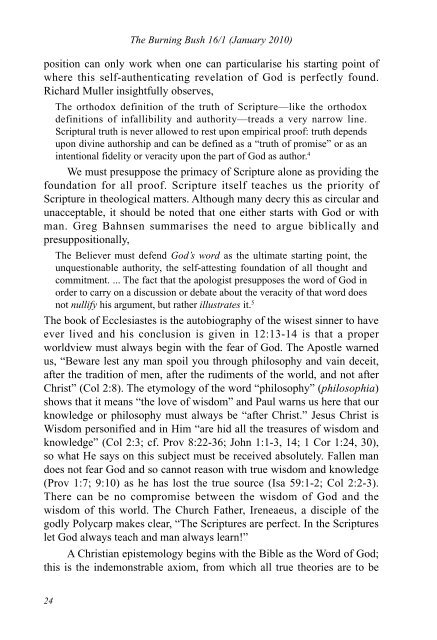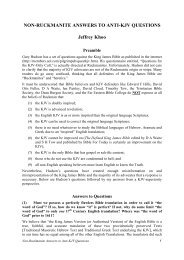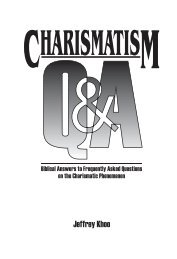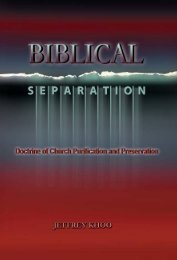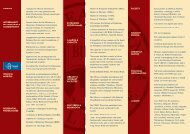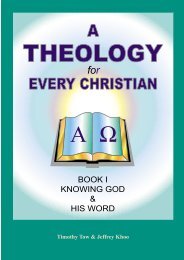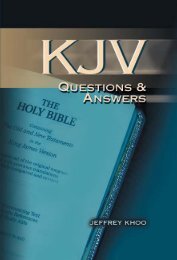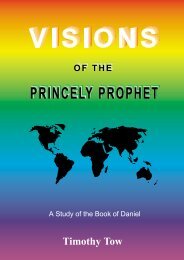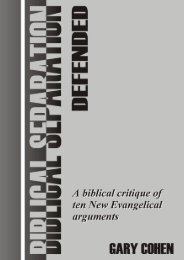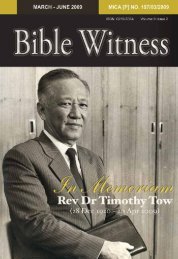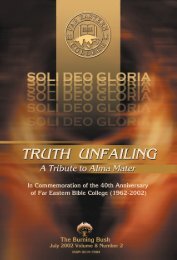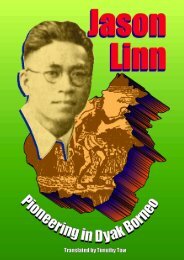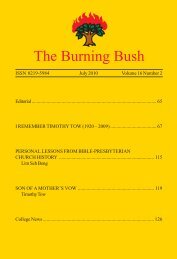The Burning Bush - Far Eastern Bible College
The Burning Bush - Far Eastern Bible College
The Burning Bush - Far Eastern Bible College
Create successful ePaper yourself
Turn your PDF publications into a flip-book with our unique Google optimized e-Paper software.
<strong>The</strong> <strong>Burning</strong> <strong>Bush</strong> 16/1 (January 2010)position can only work when one can particularise his starting point ofwhere this self-authenticating revelation of God is perfectly found.Richard Muller insightfully observes,<strong>The</strong> orthodox definition of the truth of Scripture—like the orthodoxdefinitions of infallibility and authority—treads a very narrow line.Scriptural truth is never allowed to rest upon empirical proof: truth dependsupon divine authorship and can be defined as a “truth of promise” or as anintentional fidelity or veracity upon the part of God as author. 4We must presuppose the primacy of Scripture alone as providing thefoundation for all proof. Scripture itself teaches us the priority ofScripture in theological matters. Although many decry this as circular andunacceptable, it should be noted that one either starts with God or withman. Greg Bahnsen summarises the need to argue biblically andpresuppositionally,<strong>The</strong> Believer must defend God’s word as the ultimate starting point, theunquestionable authority, the self-attesting foundation of all thought andcommitment. ... <strong>The</strong> fact that the apologist presupposes the word of God inorder to carry on a discussion or debate about the veracity of that word doesnot nullify his argument, but rather illustrates it. 5<strong>The</strong> book of Ecclesiastes is the autobiography of the wisest sinner to haveever lived and his conclusion is given in 12:13-14 is that a properworldview must always begin with the fear of God. <strong>The</strong> Apostle warnedus, “Beware lest any man spoil you through philosophy and vain deceit,after the tradition of men, after the rudiments of the world, and not afterChrist” (Col 2:8). <strong>The</strong> etymology of the word “philosophy” (philosophia)shows that it means “the love of wisdom” and Paul warns us here that ourknowledge or philosophy must always be “after Christ.” Jesus Christ isWisdom personified and in Him “are hid all the treasures of wisdom andknowledge” (Col 2:3; cf. Prov 8:22-36; John 1:1-3, 14; 1 Cor 1:24, 30),so what He says on this subject must be received absolutely. Fallen mandoes not fear God and so cannot reason with true wisdom and knowledge(Prov 1:7; 9:10) as he has lost the true source (Isa 59:1-2; Col 2:2-3).<strong>The</strong>re can be no compromise between the wisdom of God and thewisdom of this world. <strong>The</strong> Church Father, Ireneaeus, a disciple of thegodly Polycarp makes clear, “<strong>The</strong> Scriptures are perfect. In the Scriptureslet God always teach and man always learn!”A Christian epistemology begins with the <strong>Bible</strong> as the Word of God;this is the indemonstrable axiom, from which all true theories are to be24


